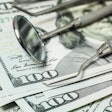
As rumors of a potential recession gain momentum, it's imperative to look back and learn from history to anticipate and prepare for what the future may hold. The Great Recession of 2007-2009 serves as a poignant reminder of economic vulnerability, significantly impacting a wide range of industries, not least of which was the dental sector.
This period saw a noticeable decline in discretionary spending, which in turn led to a decreased demand for nonessential dental services. By examining how this economic downturn affected consumer behavior and the demand for dental services, we can glean insights into potential strategies to mitigate the adverse effects of forthcoming economic challenges. Understanding these dynamics is crucial for dental professionals and industry stakeholders so they can develop resilient practices that can withstand economic pressures.
The Great Recession and its impact on dental care
The Great Recession marked one of the most challenging periods for the U.S. economy in recent history. It led to widespread job losses, decreased consumer spending, and a tightening of financial resources. As a result, many industries saw a decline in demand, including dental care.
1. Decline in dental visits
During the Great Recession, the dental industry hit a rough patch, especially when it came to the demand for general dental services. This area, which often reflects the health of the broader economy because it's something people can choose to spend on, saw fewer patient visits.
In particular, 2010 was a tough year, with visits to general dentists dipping to their lowest level. The downturn wasn't a sudden plunge but more of a slow slide, mirroring the drawn-out nature of the recession and its significant impact on what families felt comfortable spending.
The bounce back in dental services was slow, with only small signs of recovery in the years right after the recession. This sluggish recovery was due to a mix of reasons, like changes in insurance coverage, higher costs coming directly out of patients' pockets, and a general reluctance by patients to shell out for services viewed as not immediately necessary during tough financial times.
Even now, years after the recession has been declared as over, the demand for general dental care hasn't quite recovered to its prerecession levels. This lasting effect underlines how long economic downturns can impact sectors like dentistry, which are especially vulnerable to shifts in how people spend their money and the overall economic climate. It's a reminder of how crucial economic resilience is and why industries must stay flexible and adapt to changing economic situations to keep growing and thriving in the long run.
2. Sharp drop in orthodontic visits
Orthodontic care, known for its hefty costs, took a big hit. The high prices of treatments like braces and aligners led to fewer people getting these services. In fact, in 2010, only 2.5% of the U.S. population visited orthodontists, hitting an all-time low. This was a major drop from previous years, showing how tough economic times affected people's choices in their healthcare spending.
Since then, there's been a bit of a comeback, with more folks considering orthodontic services, but we're still not back to the high demand that existed before the recession. The economic downturn's lingering effects are still shaping how people think about orthodontic care, suggesting a slow and steady journey toward full recovery.
3. Economic sensitivity
The noticeable dip in demand for dental care during economic downturns puts a spotlight on how sensitive the dental industry is to financial ups and downs. When the economy hits a rough patch, people start think about where their money is going, and often, things like routine dental check-ups or treatments get pushed to the back burner.
This dip means fewer patients are coming through the doors and a delay in those nonurgent dental procedures, which can affect a dental practice's bottom line. It's a tough situation, but it's important for dental practices to skillfully navigate these challenges to keep things stable during these times.
4. Income disparities
Interestingly, the Journal of the American Dental Association study cited above showed that lower-income families had some protection against the economic downturn, thanks mainly to government help like Medicaid.
These programs were lifesavers during the recession, covering a chunk of orthodontic costs and keeping the demand for these services steady among this group. It highlights how vital these assistance programs are in cushioning the blow of economic hardships, especially for those in the lower-income brackets, ensuring they can still access crucial healthcare services.
5. Long-term effects
Years after the Great Recession, data revealed that out-of-pocket expenditures for dental services, including both general and orthodontic care, remained below predownturn levels. This trend underscores the enduring impact of economic recessions, which can significantly alter consumer behavior and spending habits.
Even as the economy shows signs of recovery, the financial cautiousness instilled by a recession can persist, leading individuals to prioritize essential expenses and potentially delaying or reducing discretionary spending in areas like dental care. This phenomenon highlights the importance of understanding the long-term effects of economic downturns on consumer spending patterns.
What could happen again?
If a new recession occurs, we could see some familiar trends popping up again in the dental industry, including the following effects.
Reduced patient visits
In times of financial uncertainty, it's common for people to delay or cancel their dental appointments, which might lead to less demand for dental services. This change affects not only the dental industry's bottom line but also patient health, since putting off preventive care can turn small issues into bigger problems.
Decreased out-of-pocket spending
When budgets get tight, people might opt for cheaper dental treatments or delay the pricier ones. This choice can really affect dental practices' incomes since they count on a good balance of routine and high-end procedures to keep them financially healthy. These changes in what folks decide to do mean dental offices need to tweak their services and pricing to keep up with what everyone needs while still ensuring their business runs smoothly.
Greater reliance on insurance
When tough economic times, such as the Great Recession, roll around, folks often find themselves leaning more on insurance and government support. This usually happens because healthcare becomes more expensive and personal incomes take a hit, making it tricky to handle health costs without some extra help.
With insurance providers also cutting dental office reimbursement rates, your practice's profitability might dip if your patients rely too much on preferred provider organization insurance plans. That's exactly why I wrote the "Fire the PPOs" e-book for dental practice owners.
Conclusion
The Great Recession was a wake-up call, showing us that the dental industry can really feel the pinch during economic downturns, just like any other sector. It's a reminder of how crucial it is to be prepared and flexible.
By looking back at those tough times, dental practices can learn valuable lessons on how to soften the blow of future recessions. We're excited to share an upcoming article that dives into practical steps and strategies that dental professionals can use to protect their practices from economic lows. Keep an eye out for tips on how to strengthen your dental practice against the next economic slump!
Jordon Comstock is the CEO and founder of BoomCloud. Comstock often speaks at conferences and writes on practice management and patient engagement.
The comments and observations expressed herein do not necessarily reflect the opinions of DrBicuspid.com, nor should they be construed as an endorsement or admonishment of any particular idea, vendor, or organization.



















